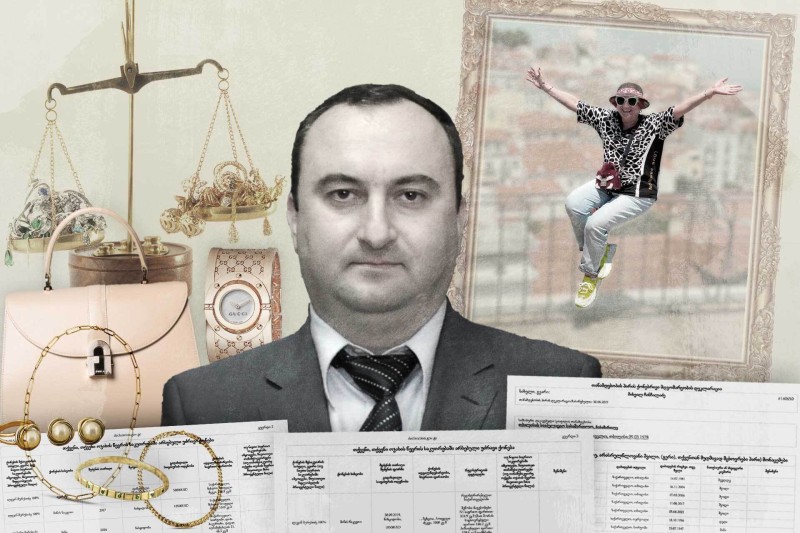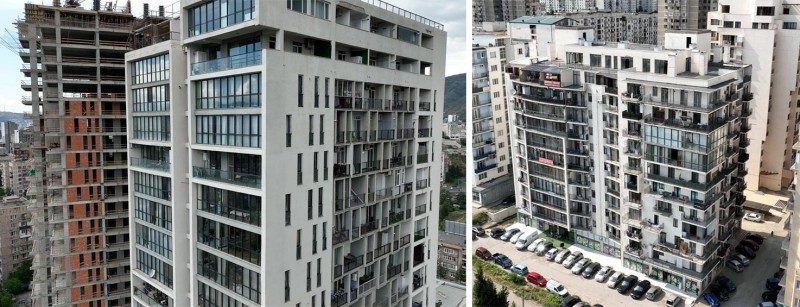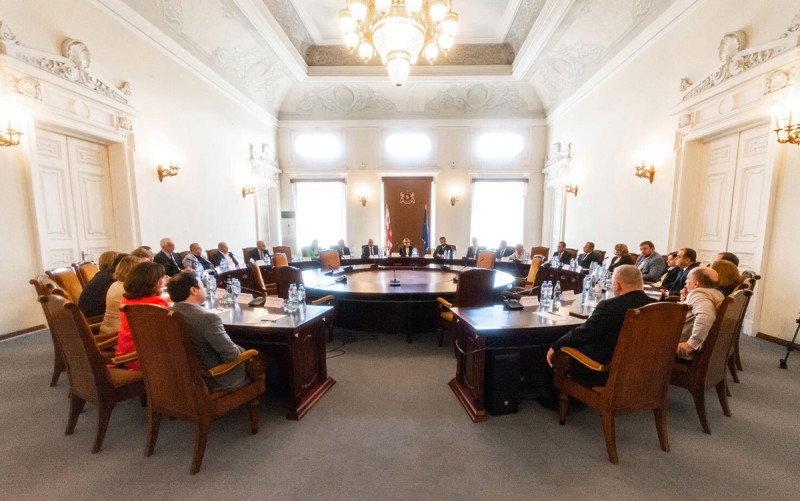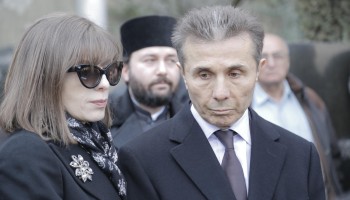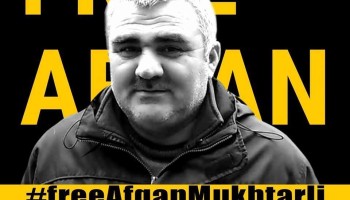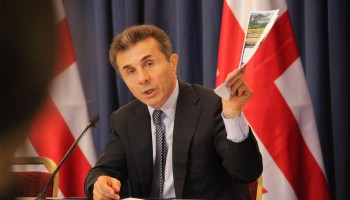In recent months, tens of thousands of people in the Caucasian country of Georgia have taken to the streets to demand their government pursue integration with Europe.
“Glory to Georgia! Glory to Europe!” protesters shouted at a massive June 20 rally in the capital, Tbilisi. “Soon we’ll be a member of the big European family! Long live Europe!”
After Russia’s invasion of Ukraine, the European Council accepted accelerated EU membership applications from Ukraine, Moldova, and Georgia. But while the other two countries received candidate status, approval of Georgia’s application was delayed.
Before being considered for membership, the Council said, Georgia must implement reforms to make its institutions more accountable and democratic.
But there’s a long way to go. One deeply-rooted problem, highlighted by the local chapter of Transparency International, is officials’ failure to fully declare their assets.
In a new investigation, reporters from OCCRP’s Georgian partner, Studio Monitor, found that the problem extends to the highest levels of the country’s judiciary.
As it turns out, one of Georgia’s most influential judges, Levan Murusidze, failed to disclose assets belonging to his long-term romantic partner in his asset declarations. This ensured that the multiple apartments, expensive jewelry, and designer clothes she acquired in recent years were hidden from public scrutiny.
That spending far exceeded what the couple’s declared salaries could pay for, raising questions about the source of their wealth.
In a previous investigation, Studio Monitor found that another influential judge, Mikheil Chinchaladze, had failed to declare significant real estate holdings registered to his aunt.
Murusidze and Chinchaladze are alleged to be the leaders of a powerful group of judges, known as “the clan,” that is said to be blocking the kind of reforms required to deepen Georgia’s ties to Europe. The two men are both associated with a powerful body called the High Council of Justice, the supreme oversight body of the country’s judicial system. They’re also believed to have a close behind-the-scenes relationship with Bidzina Ivanishvili, Georgia’s richest man and the éminence grise behind the country’s ruling party, Georgian Dream.
Nazi Janezashvili, who served for four years as a non-judge member of the High Council of Justice and is now the head of an NGO called Georgian Court Watch, identifies Chinchaladze as the clan’s “irreplaceable” top leader, along with Levan Murusidze.
It was Murusidze, she says, who helped Chinchaladze establish a behind-the-scenes relationship with Ivanishvili. “Personalities are key here, and Murusidze happened to have excellent communications skills,” she said.
“They got along well. Bidzina Ivanishvili’s power rests on this court system.”
Mikheil Chinchaladze and Bidzina Ivanishvili declined to comment.
Murusidze did not respond to questions about his asset declarations or his partner’s purchases, only telling reporters that he was not married.
A Taste for Luxury
In an Instagram photo from 2019, three middle-aged couples pose on the crowded steps of an ancient Greek ruin.
One of the men in the photo is Judge Levan Murusidze, who serves on the Tbilisi Court of Appeals. But that title does not convey the full extent of his influence: Between 2013 and 2017, he was the secretary of the High Council of Justice, a powerful body that controls all judicial appointments in Georgia.
Seated in front of him is Lela Chania, who works as the head of a secretariat in the Tbilisi City Court. Though the two are officially unmarried, they appear to be living together, and Murusidze has never denied Georgian media reports that describe her as his wife.
The couple’s relationship is also documented in an unusual place: Records pertaining to Murusidze’s charitable donations. In 2010, the prominent judge contributed to the construction fund of a monastery complex that names all its donors — and their family members — on its website. Since that year, Chania has been listed as a member of Murusidze’s family alongside his mother and father.
As such, she and all her significant possessions should appear in his annual asset declaration. But when journalists examined Murusidze’s declarations going back to 2006, Chania was nowhere to be found.
Chania told reporters that she does not live with Murusidze. “I don’t live anywhere permanently,” she said. “I have my own place to live, and if I stay somewhere else, that’s none of your business.”
But apart from uncovering their joint vacations — in addition to Greece, the couple also visited Portugal this year — reporters documented both Murusidze and Chania’s cars parked at Murusidze’s home in the village of Dzegvi, to the northwest of Tbilisi. They also observed the couple leaving the property, both in their separate cars and together. When journalists approached them, the pair quickly left the scene.
It is possible that Murusidze did not declare his relationship with Chania because it would be difficult to explain her wealth: Though she comes from humble origins, in recent years — a period that coincides with her relationship with Murusidze — she has made a number of expensive purchases.
In 2015 and 2016, Chania bought two apartments and two plots of land in Tbilisi, plus another apartment in the Black Sea resort city of Batumi, worth a total of just over $166,000. Purchase agreements obtained by reporters show that she paid for them out of pocket, without taking out a mortgage.
Until 2015, Chania was registered as living in a tiny, 12-square-meter apartment, and her annual salary in 2022 is listed as 33,000 GEL ($12,000). According to public records, she owns no businesses that could provide additional income.
If Chania saved up her entire salary, it would take her at least 14 years to afford her properties. She did not respond to reporter’s inquiries about how she managed to buy them and whether Murusidze was their true owner.
But Chania also has other spending to account for. Her Facebook photos, which have been removed since reporters first accessed them, show that she is an avid consumer of luxury brand clothing and accessories. Besides Dolce & Gabbana and Gucci, her wardrobe abounds in items from Prada, Moschino, Furla, Miu Miu, Jimmy Choo, Casadei, and Valentino.
She also acquired dozens of expensive golden rings, necklaces, earrings, and bracelets.
Murusidze’s own official salary of just under 73,000 GEL (about $26,000) per year is considerably higher than Chania’s. But it’s still insufficient to account for the extent of her possessions, especially since just under half of it goes toward paying off loans taken out for the construction of his house. He has no other known sources of income.
Because none of these items were declared — as those worth over 5,000 GEL ($1,800) are supposed to be — the Georgian public has had no opportunity to scrutinize the couple’s purchases.
“The prosecutor’s office of Georgia should take an interest in this case, especially since it involves a senior official,” said Sandro Kevkhishvili, the head of the anti-corruption team at Transparency International Georgia. “The Civil Service Bureau [where asset declarations are filed] has a department in charge of declaration monitoring, which also must study this case.”
He also suggested a possible reform. “As far as we know … the Civil Service Bureau does not have a system for verifying whether [people are] living under one roof,” he said. “This mechanism must be adopted.”
Elguja Makalatia, deputy head of the bureau, acknowledged that, in addition to joint utility payments or transfers of money between bank accounts, social media accounts can also be used as evidence that people live together.
“When we look at a public Facebook profile,” he said, “and it’s actually seen that people are together, it’s visible [that] they’re husband and wife, but they’re not in a registered marriage ... then of course [they’re] considered a permanent resident.”
Besik Vekua, who leads the bureau’s department for monitoring asset declarations, rejected criticism of the agency. And while he says that the bureau cannot act on the basis of press reports, it may review Murusidze’s case if it receives a formal referral.
“You can apply to us with a reasoned application,” he told Studio Monitor. “Attach each of these arguments, what you have and what you have searched for. After that the bureau will make a decision about the justification and we will conduct monitoring.”
In a separate written response to reporters’ questions about Murusidze, representatives of the bureau claimed to have inspected nearly 2,000 asset declarations over the past 5 years, ultimately finding violations in more than half of them and issuing fines, though only 11 were referred to prosecutors.
The ‘Clan’ and the Council
Murusidze is hardly the only influential judge who failed to declare all his assets and faced no consequences.
A previous investigation produced jointly by Studio Monitor and the Georgian service of Radio Free Europe, Radio Tavisupleba, found that another powerful judge, Mikheil Chinchaladze, failed to declare several apartments and garages in Tbilisi’s historic central neighborhood of Vera that had been purchased by his aunt for 105,000 lari ($63,000) in 2009.
Two sources who own apartments in the same building and know Chinchaladze personally told reporters that he was the true owner of the real estate registered in his aunt’s name. Regardless, he should have declared the assets during a period when she was living with him in his home.
Chinchaladze never responded to reporters’ questions about these apartments, and did not deny any aspect of the story after it was broadcast. Nevertheless, he appears to have faced no consequences. The Civil Service Bureau told reporters that no violations had been identified in his 2019 declaration.
The Murisidze and Chinchaladze cases are especially noteworthy since both judges’ independence has been called into question.
Both men have been described by knowledgeable insiders as top figures in a group of judges believed to have gained control of Georgia’s judiciary, using their influence to protect their own jobs and possibly even to influence the outcomes of specific cases.
The group, popularly known as the “clan” or the “clan of judges,” has no formal structure and its full extent is unknown, though it is thought to consist of about 30 judges. The group has not been formally investigated by the authorities, and there is no hard evidence of corruption among its members. But its existence and alleged pernicious influence has been described by independent watchdogs, senior politicians and officials, and international organizations.
Kakha Tsikarishvili, formerly an assistant to the head of Georgia’s Supreme Court, is now a member of a group of independent lawyers calling for judicial reforms. He said it’s difficult to name concrete cases of corruption within the judiciary.
“For the most part, it exists in the form of instructions given to judges on what kind of decisions they’re expected to deliver,” he said. “Clan members tell judges to make one decision or another. The judge follows orders, and the clan makes money off the relevant case.”
The members of this group are said to include the heads of many district and city courts, as well as members of the High Council of Justice, which plays a crucial role in Georgia’s judicial system. This body appoints all judges across the country and also has the authority to punish or fire judges for poor performance and to reward good work, including by granting lifetime appointments.
The council is made up of eight judges, six non-judge members (typically lawyers), and a chairperson. Murusidze himself served as the secretary between 2013 and 2017. A number of judges on the council — both former and current — reportedly have close personal and professional connections to Chinchaladze. In 2017, the council made him the first judge in Georgia ever to be appointed for life.
Tsikarishvili, the judicial reform advocate, echoes the allegations that this group of judges has established a mutually beneficial relationship with the highest echelons of power in Georgia. “We see that Georgian Dream is taking steps to slowly hand over the judicial system to the clan,” he said.
The European Commission has made a number of recommendations which must be addressed if Georgia’s EU integration is to progress.
One of those is to “ensure a judiciary that is fully and truly independent, accountable and impartial.” Another is to “implement the commitment to ‘de-oligarchisation’ by eliminating the excessive influence of vested interests in economic, political, and public life.”
The Commission did not mention Ivanishvili personally. But at the massive June 20 rally in Tbilisi, Rasa Juknevičienė, a member of the European Parliament, made clear that it had a specific name in mind.
“Everyone knows which oligarch we are talking about,” she said. “Please do not let your beautiful country become a hostage.”
